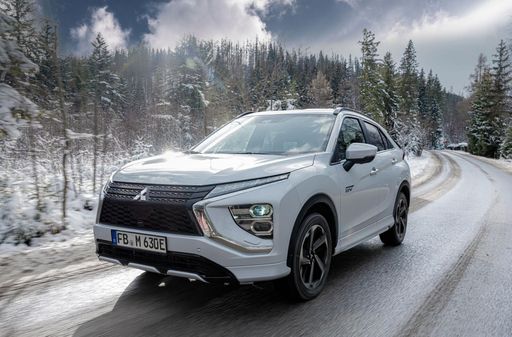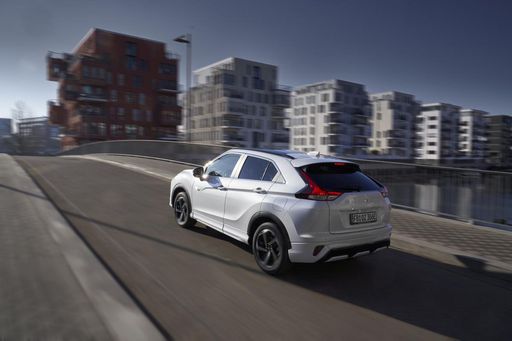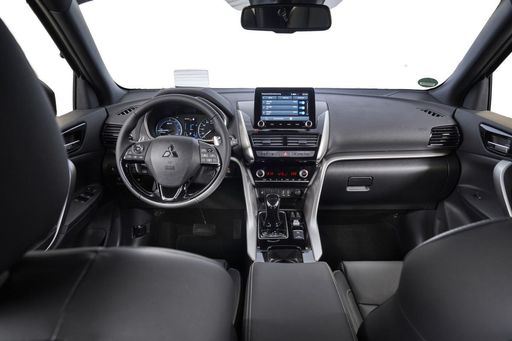Isuzu D-Max vs Mitsubishi Eclipse Cross – Differences & prices compared
Compare performance, boot space, consumption and price in one view.
Find out now: which car is the better choice for you – Isuzu D-Max or Mitsubishi Eclipse Cross?
The Isuzu D-Max (Pickup) comes with a Diesel engine and Automatic transmission. In comparison, the Mitsubishi Eclipse Cross (SUV) features a Plugin Hybrid engine with transmission.
When it comes to boot capacity, the Isuzu D-Max offers , while the Mitsubishi Eclipse Cross provides 359 L – depending on how much space you need. If you’re looking for more power, decide whether the 163 HP of the Isuzu D-Max or the 188 HP of the Mitsubishi Eclipse Cross suits your needs better.
In terms of consumption, the values are 8.70 L per 100 km for the Isuzu D-Max, and 2 L for the Mitsubishi Eclipse Cross.
Price-wise, the Isuzu D-Max starts at 34300 £, while the Mitsubishi Eclipse Cross is available from 36000 £. Compare all the details and find out which model fits your lifestyle best!
Isuzu D-Max
The Isuzu D-Max stands out in the pickup truck market with its robust design and impressive durability, making it a reliable choice for both work and leisure. Its interior blends practicality with a touch of comfort, featuring user-friendly technology that enhances the driving experience. This vehicle's off-road capabilities and strong performance make it a versatile companion for tackling a variety of terrains.
detailsMitsubishi Eclipse Cross
The Mitsubishi Eclipse Cross presents a sleek fusion of dynamic design and versatile functionality, perfect for urban adventures and weekend getaways alike. Its elegant lines and bold front grille make a strong statement on the road, while its well-appointed interior offers a comfortable and connected driving experience. With advanced safety features and intuitive technology, the Eclipse Cross ensures drivers feel secure and in control, whether navigating city streets or scenic routes.
details @ Mitsubishi Motos
@ Mitsubishi Motos
 @ Mitsubishi Motos
@ Mitsubishi Motos
 @ Mitsubishi Motos
@ Mitsubishi Motos

|
|
|
|
|
Costs and Consumption |
|
|---|---|
|
Price
34300 - 50100 £
|
Price
36000 - 42000 £
|
|
Consumption L/100km
8.7 - 9 L
|
Consumption L/100km
2 L
|
|
Consumption kWh/100km
-
|
Consumption kWh/100km
-
|
|
Electric Range
-
|
Electric Range
45 km
|
|
Battery Capacity
-
|
Battery Capacity
-
|
|
co2
228 - 235 g/km
|
co2
46 g/km
|
|
Fuel tank capacity
76 L
|
Fuel tank capacity
43 L
|
Dimensions and Body |
|
|---|---|
|
Body Type
Pickup
|
Body Type
SUV
|
|
Seats
2 - 5
|
Seats
5
|
|
Doors
2 - 4
|
Doors
5
|
|
Curb weight
1905 - 2110 kg
|
Curb weight
1985 - 2052 kg
|
|
Trunk capacity
-
|
Trunk capacity
359 L
|
|
Length
5280 - 5320 mm
|
Length
4545 mm
|
|
Width
1810 - 1870 mm
|
Width
1805 mm
|
|
Height
1770 - 1790 mm
|
Height
1685 mm
|
|
Max trunk capacity
-
|
Max trunk capacity
1108 L
|
|
Payload
990 - 1095 kg
|
Payload
373 - 440 kg
|
Engine and Performance |
|
|---|---|
|
Engine Type
Diesel
|
Engine Type
Plugin Hybrid
|
|
Transmission
Automatic
|
Transmission
-
|
|
Transmission Detail
Automatic Gearbox
|
Transmission Detail
-
|
|
Drive Type
All-Wheel Drive
|
Drive Type
All-Wheel Drive
|
|
Power HP
163 HP
|
Power HP
188 HP
|
|
Acceleration 0-100km/h
12.60 s
|
Acceleration 0-100km/h
10.90 s
|
|
Max Speed
180 km/h
|
Max Speed
162 km/h
|
|
Torque
360 Nm
|
Torque
-
|
|
Number of Cylinders
4
|
Number of Cylinders
4
|
|
Power kW
120 kW
|
Power kW
138 kW
|
|
Engine capacity
1898 cm3
|
Engine capacity
2360 cm3
|
General |
|
|---|---|
|
Model Year
2024 - 2025
|
Model Year
2021 - 2022
|
|
CO2 Efficiency Class
G
|
CO2 Efficiency Class
B
|
|
Brand
Isuzu
|
Brand
Mitsubishi
|
Isuzu D-Max
The Powerhouse on Wheels: An Overview of the Isuzu D-Max
When it comes to robust and reliable pick-up trucks, the Isuzu D-Max stands out as a formidable contender. With its range of versatile models and a reputation for toughness, the D-Max caters to the needs of both commercial users and off-road adventurers. This article delves into the technical details and innovative features that make the Isuzu D-Max a leader in its class.
Under the Bonnet: Performance and Specifications
At the heart of the Isuzu D-Max lies a 1.9-litre turbocharged diesel engine, producing a power output of 163 PS (120 kW) and a torque of 360 Nm. This robust engine is paired with either a six-speed manual or a six-speed automatic transmission, offering flexibility and control for diverse driving conditions. With a top speed of 180 km/h, the D-Max balances power and performance, making it well-suited for both urban environments and rugged terrains.
Efficiency and Eco-Standards
Fuel efficiency is a pivotal factor for many buyers, and the Isuzu D-Max delivers with a consumption ranging from 8.1 to 9.2 L/100km. Despite its impressive capabilities, the D-Max falls into CO2 efficiency class G, with emissions between 212 and 241 g/km. While this places it towards the higher end of the emissions spectrum, its efficiency is commendable considering its size and power.
Innovative Features and Driver Comfort
Isuzu has integrated numerous innovative features in the D-Max, enhancing both functionality and driver comfort. The pick-up is available in several configurations, including single, space, and double cab options with seating arrangements for 2 to 5 passengers. Equipped with state-of-the-art safety technologies and infotainment systems, the D-Max ensures a comfortable and secure ride. Various trim levels, from L 2WD to V-Cross 4WD Automatik, provide options for different preferences and requirements.
Design and Dimensions
The Isuzu D-Max's design is as practical as it is imposing. Measuring between 5270 mm to 5310 mm in length and 1810 mm to 1870 mm in width, with a height of 1770 mm to 1790 mm, it offers a commanding road presence. Its substantial payload capacity ranges from 995 kg to an impressive 1130 kg, making it an ideal choice for heavy-duty operations.
Pricing and Market Position
The Isuzu D-Max is competitively priced within the range of 35,765€ to 56,765€, illustrating its value proposition in the pick-up truck market. It caters to varied customer needs with an extensive line-up and competitive pricing, thereby solidifying its position as a top choice for those seeking a reliable and durable pick-up.
Conclusion: A Vehicle Built for Versatility
The Isuzu D-Max is more than just a workhorse; it is a testament to engineering capable of blending power, practicality, and innovation. Its enduring appeal lies in its versatility and robust performance, making it a popular choice across different demographics and industries.
Mitsubishi Eclipse Cross
Unveiling the Mitsubishi Eclipse Cross: A Pioneer in Innovation
The Mitsubishi Eclipse Cross has captivated the automotive world since its introduction. This SUV merges the heritage of Mitsubishi's Eclipse sports coupe with the robust aesthetics of a modern crossover, creating a vehicle that stands out both on urban roads and open highways. Let's delve into the innovative features and technical details that define this remarkable vehicle.
Powerful Hybrid Performance
At the heart of the Mitsubishi Eclipse Cross is its cutting-edge plug-in hybrid engine. With a power output of 188 PS (138 kW), this hybrid marvel combines a traditional 2.4-litre petrol engine with an advanced electric motor, delivering an impressive fuel economy of just 2 litres per 100 km. Not only does it offer optimal performance, but it also commits to eco-friendliness with a CO2 emission rated at a mere 46 g/km.
All-Wheel Drive for Unmatched Control
The Eclipse Cross comes equipped with an all-wheel-drive system, ensuring traction and stability across various terrains. This is particularly beneficial for drivers who venture beyond the smooth highways, providing confidence and control whether you're tackling slippery city streets or rugged countryside trails.
Design and Comfort: A Fusion of Style and Practicality
The striking design of the Mitsubishi Eclipse Cross is a fusion of style and functionality. Its dimensions, 4545 mm in length, 1805 mm in width, and 1685 mm in height, contribute to a spacious interior without compromising on an elegant silhouette. This SUV comfortably seats five passengers and boasts a generous boot space of 359 litres, ideal for family getaways or adventure trips.
Technological Advancements for Modern Drivers
Mitsubishi has integrated several technological advancements into the Eclipse Cross to enhance driving experience. The model offers an electric range of 45 km, perfect for daily commutes or short journeys without engaging the conventional engine. Additionally, its user-friendly infotainment system ensures connectivity and entertainment on the go.
Safety Features: Protecting What Matters Most
Safety is paramount in the design of the Eclipse Cross. It includes a selection of contemporary safety features to protect both passengers and pedestrians. With a CO2 efficiency class rated at B, it not only aims to safeguard its passengers with advanced collision mitigation systems but also to ensure a greener and more sustainable driving experience.
Value for Money: The Perfect Investment
Positioned with a price range between €41,990 and €48,990, the Mitsubishi Eclipse Cross offers substantial value considering its hybrid technology and comprehensive feature set. Additionally, with monthly costs ranging from €1,165 to €1,258 and cost per km between 46.6 and 50.3 cents, it is an economically sound choice for eco-conscious drivers looking for an efficient and reliable vehicle.
In conclusion, with its blend of hybrid power, all-wheel-drive capability, and a focus on innovation and safety, the Mitsubishi Eclipse Cross is an ideal candidate for those seeking a versatile and efficient SUV. Whether you're navigating city streets or cruising countryside roads, the Eclipse Cross promises a drive that is both exhilarating and responsible.
What drivetrain options does the Isuzu D-Max have?
Available configurations include All-Wheel Drive.
The prices and data displayed are estimates based on German list prices and may vary by country. This information is not legally binding.
